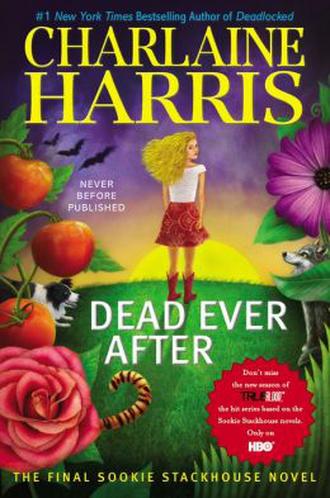
“Any reviewer who expresses rage or loathing for a novel is preposterous. He or she is like a person who has put on full armour and attacked a hot fudge sundae.” – Kurt Vonnegut
I couldn’t resist opening with this quote. It’s been a long time since I’ve read a book that’s caused such a firestorm among fans and reviewers. Thanks to a German reader who had access to the worldwide web, I (and everyone else) knew the ending of “Dead Ever After” before it was released in the U.S. But I felt I needed to read the entire novel anyway – having devoured the previous twelve books in the series. I had to see for myself if other fans were justified in their shock and disappointment with how this long saga was brought to a close by Charlaine Harris.
There’s no way to talk about such a topic without spoilers being involved. This review is primarily for those of us who’ve been fans since the very beginning – way before True Blood premiered on HBO in 2008. (And by the way, the TV series is much different than the books.) I’ve read other reviews by unhappy fans, and I’ve watched them get bashed online by writers, friends of Charlaine, who admitted they have never even read any of the novels. Not one. I hardly think that’s fair, and it’s not very professional either.
I’ve tried to look at the issue from two perspectives: as a writer and a reader/fan.
“Dead Ever After” had a different feel to it from the start. In the previous books, the point of view character was always Sookie Stackhouse, the telepathic heroine of the series. In this last installment, the author used multiple viewpoints. No big deal to me. When the book begins, Sookie is now estranged from her vampire lover Eric Northman, and is soon accused of killing her former friend and co-worker, Arlene. To make things more complicated, at least three people are out to get Sookie. However, in my opinion, only one has a proper, believable motivation to end her existence. (The worst motivation: We are expected to believe that her gay fae cousin, Claude, wants to kill Sookie because she never expressed a desire to sleep with him while he was living with her. Huh?)
In the first sections, similar to a prologue, I was bothered by the details involved when a businessman makes a deal with the devil. He sells his soul to Satan, and convinces his associate to do the same. He gets two wishes in return. He wants to be prosperous again – and he wants a fae object that Sookie has, which grants one wish to the owner. What? He wants the “cluviel dor” so he can have influence over his wayward witch of a daughter. Why didn’t he just ask the devil to make it so?
Throughout the novel, I kept getting the feeling that another author wrote the book instead of Harris. The narrative flow, the way the characters behaved (contradicting their opinions/attitudes from previous books), all seemed strangely unfamiliar. Having been exposed to Charlaine’s forum and having read many interviews with her, perhaps a few things shouldn’t have surprised me at all. She has always stated that she never liked Sookie’s long-term love interest, Eric. She wanted to end things between them early on, but the publishers told her that the Sookie/Eric partnership was too popular with readers and it increased sales. Apparently, she also wanted to end the series after writing four to six books. But, again, the publishers convinced her to continue on and stretch out the storyline. In the meantime, the author kept promising faithful readers that Sookie would eventually have her “happily ever after.” Whatever that meant.
The main criticism I have with “Dead Ever After” is that Charlaine should never have had to write it. She ended this book, and the series, the way she always intended to from the beginning, when she thought there would be half as many novels, and that’s why so many readers are upset. Fans don’t understand how Sookie could end up having a love affair with her boss and friend (a shape-shifter she’d already known for five years when the series began) when there had been no hint of a romance between them at all since the first book, when a brief kiss didn’t go over so well. There were many missed opportunities in previous books to end the Eric affair and start a romance between Sam and Sookie, but Charlaine didn’t make that choice – probably because the publisher wouldn’t have been pleased.
The ending of this series did not give me a warm, fuzzy feeling. Sookie doesn’t really get her happily ever after, and neither do any of the other characters as far as I can tell. Eric is turned into a villain and is sent away to be a vampire queen’s reluctant husband. Sookie tells Sam they should take it extra slow – and who knows, perhaps their feelings were influenced by the magic of the cluviel dor when she used it to save his life (at the end of the last book, Deadlocked). As for her life – it hasn’t changed much at all from the way it was in the very beginning. She’s not a virgin anymore and she has a little extra money after becoming Sam’s business partner at Merlotte’s Bar & Grill, but other than that she’s still left hating her telepathic gift and worrying about what everyone in town might think of her. I was hoping she’d finally realize her special ability was a super-power and use it as such.
It doesn’t seem right that a character could go through so much over such a long period of time and yet change so little.


